Dodd Named Executive Director of National Center for Hospitality Studies at Sullivan University
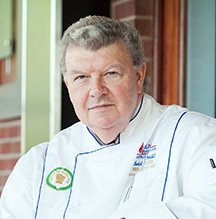 After nearly 12 years with Sullivan University, Chef David Dodd has been named executive director of the National Center for Hospitality Studies (NCHS) at the Louisville-based culinary school. Previously director of NCHS, Dodd will now oversee all food and beverage operations at both Louisville and Lexington campuses as well as all aspects of NCHS including The Bakery at Sullivan University retail and wholesale operations, Juleps Catering and Winston’s Restaurant.
After nearly 12 years with Sullivan University, Chef David Dodd has been named executive director of the National Center for Hospitality Studies (NCHS) at the Louisville-based culinary school. Previously director of NCHS, Dodd will now oversee all food and beverage operations at both Louisville and Lexington campuses as well as all aspects of NCHS including The Bakery at Sullivan University retail and wholesale operations, Juleps Catering and Winston’s Restaurant.
“I’m delighted for this new opportunity and challenge,” says Dodd. “Having spent more than a decade working with students at NCHS, I look forward to enhancing their experience and getting more involved with the business side of the program with The Bakery, Juleps and Winston’s.”
Prior to joining NCHS in 2002 as the chair of the weekend and evening program, Dodd worked as the corporate chef for Gourmet Kitchens, Inc., overseeing quality standards, menu writing and recipe compilations for the company’s five Chicago divisions. He spent eight years as the manager and technical advisor for Unilever’s Van den Bergh Foods Company and has consulted for numerous outlets including Starbucks, Lipton Tea and Papa John’s Pizza.
Dodd received his Master Chef and Master Pastry Chef Diplomas from the City and Guilds of London Institute. Her Majesty Queen Elizabeth II awarded Dodd membership in the Most Excellent Order of the British Empire for his laudatory services to the culinary profession. He served more than 20 years in the British Army with eight of those assigned as Special Commitment Chef to the Royal Household, which included designing and creating Princess Anne’s wedding cake and her children’s christening cakes, as well as other assignments at Windsor Castle.

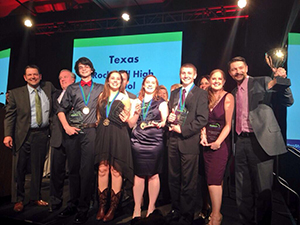 It was a familiar sight at the recent 2014 National ProStart Invitational Awards Dinner in Austin as the teams from two Texas high schools waited to hear the results after demonstrating their mastery of restaurant-leadership skills in a fast-paced culinary and restaurant-management competition.
It was a familiar sight at the recent 2014 National ProStart Invitational Awards Dinner in Austin as the teams from two Texas high schools waited to hear the results after demonstrating their mastery of restaurant-leadership skills in a fast-paced culinary and restaurant-management competition.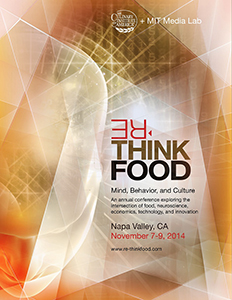 Every dish we cook, every meal we eat represents the convergence of head, heart and hands. reThink Food: Mind, Behavior, and Culture, is a new conference series co-presented by The Culinary Institute of America (CIA) and the MIT Media Lab to explore how we experience food—from the workings of our sensory systems, to the impact of new technologies on our food systems, to the habits and rituals that bind us.
Every dish we cook, every meal we eat represents the convergence of head, heart and hands. reThink Food: Mind, Behavior, and Culture, is a new conference series co-presented by The Culinary Institute of America (CIA) and the MIT Media Lab to explore how we experience food—from the workings of our sensory systems, to the impact of new technologies on our food systems, to the habits and rituals that bind us. Are you branding your program, public foodservice outlets and catering services effectively? Start with a great logo, which informs branding and drives business.
Are you branding your program, public foodservice outlets and catering services effectively? Start with a great logo, which informs branding and drives business.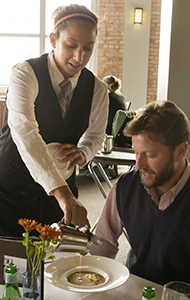 Americans are said to live and operate in an “experience” economy. But a new way of creating value via loyalty rather than premium price is beginning to emerge. What does this mean to our students and their future careers in foodservice? Part one of a two-part focus.
Americans are said to live and operate in an “experience” economy. But a new way of creating value via loyalty rather than premium price is beginning to emerge. What does this mean to our students and their future careers in foodservice? Part one of a two-part focus. The Global Culinary Innovators Association and International Food and Beverage Technology Association announced their respective formations at the industry’s largest trade show last month.
The Global Culinary Innovators Association and International Food and Beverage Technology Association announced their respective formations at the industry’s largest trade show last month.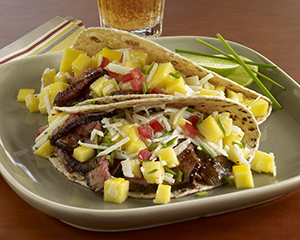 Research and trend predictions point in the same direction: Use more fresh mango on menus.
Research and trend predictions point in the same direction: Use more fresh mango on menus. Whether you maintain one or 21, building the practice of keeping a journal and recording key ideas and activities can very useful for three important reasons.
Whether you maintain one or 21, building the practice of keeping a journal and recording key ideas and activities can very useful for three important reasons. Are you dooming your students to failure by not focusing enough attention on helping them find and keep jobs after graduation?
Are you dooming your students to failure by not focusing enough attention on helping them find and keep jobs after graduation?